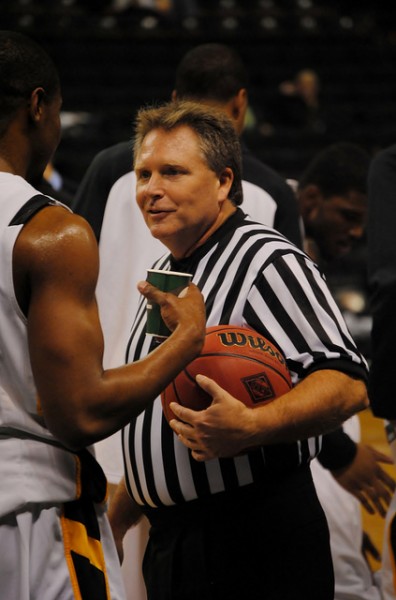Let’s Talk Early Returns on Officiating and the New Foul Rules
Posted by Brad Jenkins (@bradjenk) on November 13th, 2013Ken Pomeroy has an interesting post on his website concerning the early effect of the enforcement of new rules regarding contact by the defender. He acknowledges that the sample size is very small, but he basically compared all the Division I games last weekend with a similar number of games to start last season. Scoring is up by about 4.5 points per team while tempo has only increased by about one possession per team. Therefore almost all of the scoring increase is because of an increase in fouls called, which has resulted in nearly nine more free throw attempts per game. With the number of possessions and field goal attempts remaining steady, the tradeoff has come in fewer turnovers, specifically those caused by steals. Overall, it appears that officials are calling fouls for defensive contact that last year resulted in steals.
Many coaches have expressed concerns with the new rules, mostly regarding consistent enforcement. That is a reasonable worry since college basketball has no organized governance structure over officials during the regular season, with assignments made by individual conferences. There is, however, a national element with respect to the NCAA Tournament. Those officiating assignments are made by NCAA director of men’s basketball officiating, John Adams, who sounds like a supporter of the new rules. On Monday’s ESPN College Basketball Podcast, Tom Izzo and Bill Self both expressed concerns with how officials will call fouls. There was even a suggestion that the NCAA might want to make an example of the new officiating style by calling the Champions Classic games closely and putting all the stars on the bench with foul trouble. Last night’s games totaled 46 and 53 fouls, respectively, a high number (the season average thus far is 42) but not completely off kilter. And really only Michigan State’s Adreian Payne spent much of crunch time in foul trouble (Duke’s Jabari Parker fouled out late, but Kansas had already surged ahead at that point). John Calipari had a different take, basically echoing what Jay Bilas has been saying: “If you don’t want fouls to be called on you, then just don’t foul.” Sounds simple enough.
At first glance it appears that some top officials are trying to help the players and coaches work through the proper way to play defense. During the Duke-Davidson game last Friday night, veteran official Karl Hess was seen several times letting players and coaches on both teams know exactly why fouls were called. This improved communication may explain a surprising discovery in Pomeroy’s data set. Believe it or not, the biggest statistical change of all so far has been in the number of technical fouls called. There were just 24 techs called in the first 163 games, about half the amount called last year at this point.
Eventually we hope to see a more free-flowing sport but right now we are only in the first stage of the process that will probably require an entire season of transition. Officials must enforce the new rules as consistently as possible, game to game. Players need to adapt to not playing defense with their hands. Coaches need to teach players to defend that way, and they need to allow officials to do their job without constant complaining both on and off the court. And finally, fans have to understand that that all of this will take time. If we have to endure some long foul-plagued games to get there, then that’s the price we have to pay for the future betterment of the game.











































